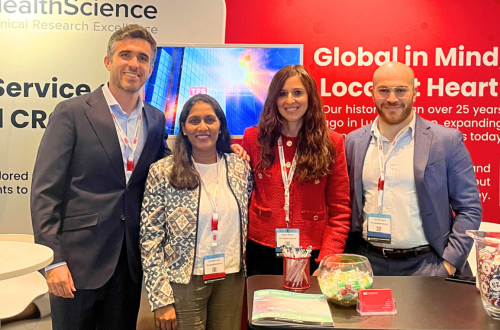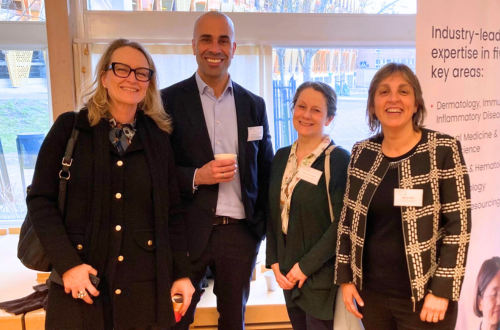Top Insights from OCT Europe 2024
Arena International’s Outsourcing in Clinical Trials (OCT) Europe 2024 conference held in Barcelona was a pivotal event this year in the clinical trials industry. Now in its 14th year, this annual European clinical event was created to provide practical insights and solutions to tackle the most pressing operational and outsourcing challenges in clinical trials. This conference serves as a platform for industry professionals to come together and exchange knowledge, with an emphasis on collaboration, with the goal of advancing clinical development by focusing on clinical operations, innovation, and technology. In an industry where regulations are continuously evolving, and technology is rapidly advancing, OCT Europe 2024 seeks to address the everyday and future challenges that professionals encounter in the clinical trial space.
In this article, we highlight the top insights emerging from this year’s conference, contributed by top industry professionals and thought leaders in the clinical trials space. Read on to learn the key findings discussed at OCT Europe 2024!
OCT Europe 2024 Insight #1:
The Evolution from Patient-Centricity to Mutual Benefit in Clinical Trials
In recent years, the term and concept of “patient centricity” has become a core theme in the clinical trials industry, with pharmaceutical sponsors and investigators understanding the importance of remembering the central role of patients. Wider acceptance of patient centricity has led clinical trial researchers, sponsors, and contract research organizations (CROs) to strive to ensure all activities and decisions related to trial design and execution have the patient’s perspective in mind. However, a new perspective on this well-known approach was suggested at this year’s OCT Europe conference.
Although it was agreed that patients do, in fact, play a crucial role in any clinical trial, OCT Europe speakers debated whether focusing solely on them might result in a one-sided approach. Undoubtedly, clinical trials are a complex process involving multiple stakeholders, including but not limited to sponsors, CROs, and patient advocacy groups. As a result, instead of a patient-centric approach, the conference suggested the industry should aim to optimize mutual benefit instead, where all parties involved in a clinical trial receive significant benefits from the research. The reasoning behind this was that it would potentially ensure a more equitable and efficient clinical trial process over the traditional concept of patient centricity.
OCT Europe 2024 Insight #2:
The Significance of Co-Creation in Clinical Trials
The conference also highlighted the concept of co-creation in the design and execution of clinical trials. Among the speakers at OCT Europe, this year was Upinder Grewal, the strategic lead of exploration and discovery at DS&AI at Bayer, who emphasized that all stakeholders must work together from the start of any clinical trial. He underscored the importance of adopting a cooperative approach within the industry because it was integral to understanding the real gaps and needs of a study throughout its lifecycle. Moreover, such an approach ensures the team as a whole is aware of the perspectives offered by each of the parties involved, including patients, sponsors, CROs, and regulators. Grewal ended by suggesting these collaborative efforts would lead to more effective and patient-friendly clinical trials.
OCT Europe 2024 Insight #3:
Rewarding All Beneficiaries of Clinical Trial Innovation
Innovation and its beneficiaries were another key discussion point at this year’s OCT Europe conference. In his panel, Gabriel Maeztu, co-founder of IOMED, a leading artificial intelligence (AI) healthcare data company, highlighted an often-overlooked aspect of innovation in clinical trials. He stated that if the benefits of innovation are not distributed equally among all stakeholders, the resulting imbalance could feed into potential discontent experienced by those benefiting less. Maeztu illustrated this point with an example from a dermatology study where AI was used to evaluate data, wherein the study investigators were initially excited about the use of AI, but eventually felt sidelined when they did not have access to the AI-evaluated results. In this example, the sponsors reaped most of the benefits, underscoring Maeztu’s point on the importance of inclusivity and equitable distribution of benefits derived from innovation in clinical trials.
OCT Europe 2024 Insight #4:
Emphasis on Mutual Investment and Strong Site Relationships in Clinical Trials
Among the numerous sessions at the OCT Europe 2024 conference, Amelia Hursey, a research manager for Parkinson’s Europe, led a panel shedding light on the essential role of mutual investment in clinical trials. Hursey emphasized that the goal should not solely be to educate the public about research but also to involve them in the research process. She stated that mutual investment in clinical trials requires a blend of knowledge, wisdom, and the sharing of insights from various perspectives rather than education alone. Using this approach, Hursey suggested that key clinical trial stakeholders could promote a more meaningful and inclusive research process.
Similarly, Richard Gray, managing partner of EMEAR Enterprise, Medidata Solutions, touched on the importance of maintaining relationships with clinical trial sites to understand their needs in his session at OCT Europe 2024. His discussion explained that, beyond understanding the physical limitations or resources of a site, sponsors must develop a deep understanding of what each site can manage, as well as their specific challenges, strengths, and capabilities.
Gray also addressed the challenges that sites face, recognizing that sites require better communication, training, and technical manuals. However, he clarified that resolving these challenges requires more than simply providing resources. Innovation and advanced technology may lend the tools to achieving significant success, but without overcoming fundamental issues unique to a site with the right communication, both sponsors and sites will remain limited in their potential.
OCT Europe 2024 Insight #5:
Addressing Recent Regulatory and Technological Changes
Lastly, this year’s OCT Europe conference also served as a platform for discussion on recent regulatory and technological changes in the clinical trial industry. Most significant is the European Medicines Agency’s (EMA) transition from the Clinical Trials Directive (CTD) to the Clinical Trials Regulation (CTR), which all sponsors must comply with by January 2025. A key issue with the CTR, as acknowledged by several panelists at OCT Europe, was the room for interpretation within the guidance. Specifically, Dr. Sol Yates, an associate director for Shionogi Europe, pointed out that some health authorities may create additional challenges by making their own interpretations of the regulation when filing in different European countries.
Lastly, the conference featured a key discussion on technological changes using AI and machine learning, particularly on Archer, an AI system developed by Ignite Data and the European Institute of Innovation through Health Data (i-HD). As explained by Mats Sundgren, Ph.D., Archer was designed to automatically transfer real-world data from electronic health records (EHR) to electronic data capture (EDC). He emphasized the potential for introducing data efficiencies with this technology to create more effective clinical trials. However, Dr. Yates raised critical concerns regarding the lack of tech development in EMA guidance, particularly the absence of AI mentions in the CTR, given its increasing prevalence in the data processing field.
Read more about EU regulations vs. U.S. practices here!
TFS HealthScience Led Gene Therapy Clinical Trials Discussions at OCT Europe 2024
Leading CROs, including TFS HealthScience, were also front and center at the OCT Europe 2024 conference, with many showcasing their expertise and commitment to the advancement of clinical trials. The highlight of TFS’s participation was the presentation delivered by Lakshmi Guduri, Director of Project Management, on ‘Pioneering Gene Therapy in Rare Diseases: A Path to Revolutionary Treatments‘. Guduri, with her extensive experience in the pharmaceutical, biotech, and CRO industries, provided insights into the role of gene therapy research in rare disease treatment. Industry professionals attending OCT Europe gained an understanding of the complexities involved in conducting gene therapy clinical trials, as well as the approach adopted by TFS to navigate common project management hurdles specific to gene therapy research. Her session underscored a new era of medical breakthroughs and shed light on several solutions to unique challenges posed by gene therapy trials. Guduru also shared how TFS consistently navigates these challenges with their modern digital solutions, highlighting the crucial role of CROs in advancing innovation in clinical trials.
Conclusion
In conclusion, the OCT Europe 2024 conference was a significant gathering of industry professionals, offering a platform for the exchange of knowledge and insights on pressing issues and innovations in the field of clinical trials. Furthermore, the participation of leading CROs, such as TFS HealthScience, underscored the crucial role these organizations play in advancing modern clinical trial innovation. As we move forward, these key insights and discussions from this year’s OCT Europe conference will no doubt help guide clinical trial professionals worldwide in tackling the industry’s unique challenges and rapidly emerging opportunities.
About TFS HealthScience CRO
TFS HealthScience is a global CRO that supports biotechnology and pharmaceutical companies throughout their entire clinical development journey. In partnership with customers, we build solution-driven teams working for a healthier future. As a trusted CRO partner throughout the entire clinical development journey, we understand the importance of providing essential and diverse services to streamline clinical trials for our clients. Visit our website to learn more about the solutions TFS can offer for your next clinical trial, or connect with a TFS representative today!
Reference:
Some of the insights in this blog were referenced from the article, “OCT in Europe: Everyone Stands to Benefit from the Research.” written by Abigail Beaney.
Connect with Us
Contact us today to discover how TFS can be your strategic CRO partner in clinical development.



